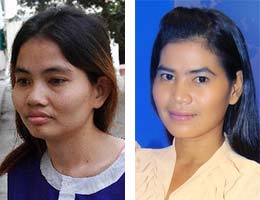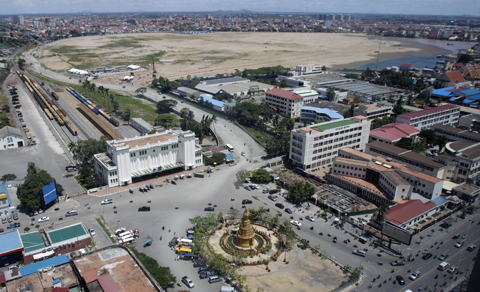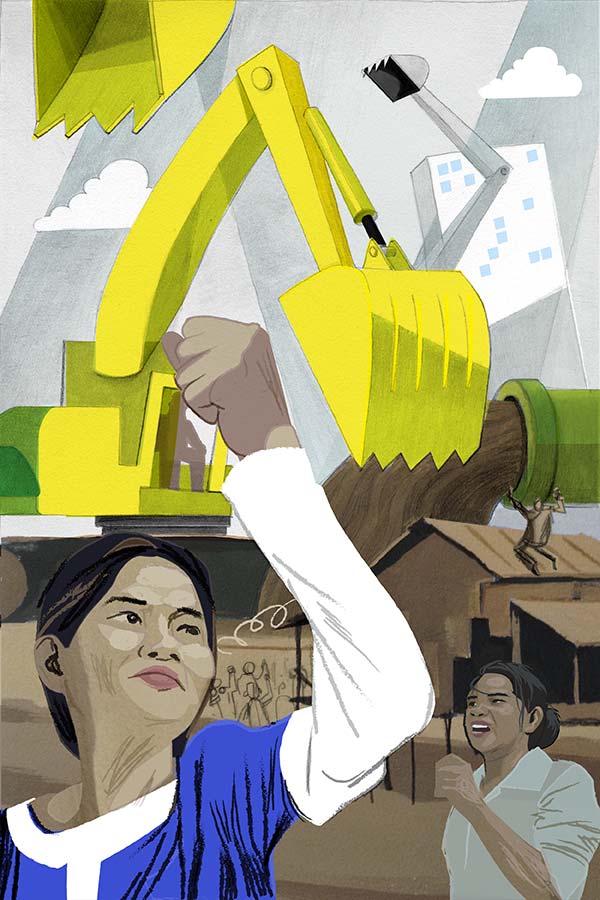Convicted of “intentional violence” and led away by police in December 2012, Yorm Bopha yelled: “Who does the judge work for? Does the judge work for the people or not?”
Thousands of people have either been evicted from their homes or are at risk of losing them since a Chinese development company was granted a 99-year lease in the Boeung Kak Lake area in 2007. The following year the developer began draining the lake to make way for construction. A promise of consultation with local residents was never honored.
The families who accepted relocation found themselves in places too far from their jobs and were deprived of transportation and without basic services such as markets and schools. Some were not compensated enough to buy a new house.

Yorm Bopha and Tep Vanny
Yorm Bopha mobilized her neighbors and led resistance, demanding transparency and better compensation. When she was later sent to prison, charged with beating a neighborhood thief, Tep Vanny picked up the fight. Vanny ceaselessly campaigned for her friend’s release, which she won in November 2013 when the Supreme Court ordered her case to be reinvestigated.
Many thought the sentence was meant as intimidation, as Yorm Bopha had led daily protests against the municipal government to secure the release of the “Boeung Kak 13”—a group of women jailed on charges of encroaching on private land and obstructing authority.
Indeed, Bopha and Vanny were not alone in their mission, but they both paid dearly for their defiance. Prison sentences, defamation charges, insults, loss of income—none of this deterred them.

Thousands of people have either been evicted from their homes or are at risk of losing them since a Chinese development company was granted a 99-year lease in the Boeung Kak Lake area in 2007. AP
And as the years went by, repression only strengthened their resolve.
“I no longer have any physical strength. What I still do have, though, is my mental strength. If we don’t want history to repeat itself, we need to get involved. I want my children to have a better future, a bright future,” says Tep Vanny, referring to the murderous regime led by the Khmer Rouge from 1975 to 1979.
Both women are married with one young child. Yorm Bopha is married to activist Lous Sakhorn.
They can claim victories even if the construction goes on and many families remain in limbo.
The “Boeung Kak 13” group of women protesters were released early, thanks to their efforts.
“I no longer have any physical strength. What I still do have, though, is my mental strength. If we don't want history to repeat itself, we need to get involved.”
And The World Bank, a large donor for land relocation in Cambodia where all ownership proofs were destroyed by the Khmer Rouge, took notice of the women’s claims and suspended loans at least temporarily in 2011.
While in prison, Yorm Bopha thanks to the tireless support of Tep Vanny and others became an Amnesty International Prisoner of Conscience. She made her first trip to the U.S. in June 2014 to receive the James Lawson Award for Outstanding Achievement in the Practice of Nonviolent Action.
For her part, Tep Vanny was honored with the 2013 Vital Voices Global Leadership Award for Leadership in Public Life. Her message to the Cambodia Prime Minister Hun Sen was: “We are not robots. We are human beings.”
Now, the women have widened their scope of work to other social causes.
In January 2014, they were briefly arrested with five others as they attempted to deliver a petition to the French Embassy demanding that the right to peaceful protest in Cambodia be respected.
In the same month, they stood among other human rights activists outside Cambodia’s Supreme Court to demand the release of 21 protesters arrested after security forces fired on striking garment workers on January 3, killing five.
“We still have plans. We will struggle until we have justice and solutions,” said Tep Vanny.
“People like us are not against development. But development must also come from the people themselves,” she added during an interview with the NGO Front Line Defenders.
“I had never thought about becoming a political leader. Women in Cambodia have never protested before. Just like me, they have stayed at home, cooked food, and looked after the children. But now, several women have plucked up the courage to join the struggle,” says Vanny.
To a large extent, these women are inspired by Yorm Bopha and Tep Vanny.


 “It's Not OK: Women struggling for human rights” is a series of portraits of Asian women caught in the struggle for human rights in their communities. It was produced by Radio Free Asia. Download the
“It's Not OK: Women struggling for human rights” is a series of portraits of Asian women caught in the struggle for human rights in their communities. It was produced by Radio Free Asia. Download the